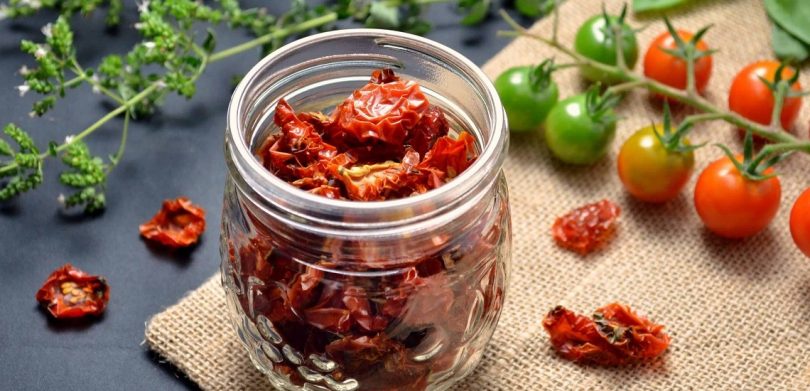Dehydrated vegetables could last for two years. But, storing dried vegetables properly is key to making them last longer. There are lots of food storage options available. You can opt for glass, stainless steel or plastic airtight containers. You can also go for vacuum packaging or you can keep the food in your freezer.
How to Store Dried Vegetables
It is best to dry or dehydrate vegetables right after the harvest. If you’re buying from the grocery store, look for fresh vegetables that are lively in color and have no soft spots.
Drying vegetables will allow the color, texture, and flavor to be intact. The process also helps preserve the sugar and nutrition contents. You can dry vegetables using a dehydrator or oven. You may also opt for sun-drying. A well-dehydrated vegetable is hard and brittle.
Once dried, cool the vegetables for one hour before storing them. Here are some common things to keep in mind when storing dried vegetables.
- Ensure that the containers are clean and dry.
- Light, heat, and air cause food to spoil easily. It is important to keep the dried vegetables in containers with a tight-fitting lid.
- Pack dried vegetables in small batches enough for one-time cooking or consumption. Using a large container will expose the vegetables to air and moisture. Worse, if you re-open the container frequently. This will affect the quality of food and might lead to spoilage.
- Label each container with the type of vegetable in it and packing date.
- Place containers in a cool, dry, and dark place. You may also place the dried foods inside freezer containers and store them in your freezer.
- Check your stored dried vegetables regularly. See if there’s any moisture inside the container. Once you see some, dehydrate the vegetables again for a few more hours.
- Check the dried vegetables for any sign of mold or bad smell before using or consuming them. If you find molds, recycle the dried food by adding them to your compost.
- Older items should be placed in front or on top of your pantry or freezer for easier access. This will ensure that you’ll be able to use them while they’re still fresh.
Dried foods can be stored for 4 to 12 months. Dried vegetables can be stored for about 6 months at temperatures of 60 degrees Fahrenheit (15 degrees Celsius). Some experts say that they can be stored for 8-10 years in a stable room temperature (70 degrees Fahrenheit or 21 degrees Celsius). The rule of thumb is, the lower the temperature, the longer the storage time.
Here are different methods of storing dried vegetables.
Airtight containers
These containers can be made of glass, plastic, acrylic or stainless steel.
Whatever type of container you choose, the lid should be airtight and easy to open or close. Make sure the containers are thick enough and won’t tear easily.
For glass containers, look for chip-resistant and shatter-proof ones. You may also choose square or rectangular stackable containers. This will help you maximize the space in your pantry.
Invest in containers that are enough for your need. If you won’t be able to fill up the container, the air in it might cause the food to spoil. Also, look for dish-washer safe containers.
Pros
- Airtight containers keep air and moisture away from your dried vegetables. This allows your dried food to last longer.
- Tight lids prevent the dried vegetables from spilling, especially if you’ve powderized them.
- Stackable containers keep your pantry organized.
- Glass airtight containers are generally odor resistant. This means the flavor and aroma of your dried food will be intact.
Cons
- Plastic containers are lightweight and budget-friendly. But it may contain BPA, which is a toxic chemical. So choose BPA-free plastic containers.
- Stainless steel containers are durable but they’re also pricey.
Freezer
This method of storing dried vegetables has been used for centuries. To freeze your dried vegetables, you’ll need a freezer and freezer containers. You may opt for vacuum packaging before freezing the vegetables.
Pros
- Dried vegetables are safe to store at room temperature. But placing them in the fridge or freezer will keep them crisp and fresh longer. This is important, especially for people living in high humidity places.
- Place dried food inside vacuum-sealed bags before placing them in the freezer. This will allow you to seal in the freshness.
Cons
- Dried vegetables that are not placed in freezer containers may be exposed to air. This will cause freezer burn and affect the food’s texture and flavor. Also, the dried food may absorb the smell of other items in the freezer.
- Freezers are costly and using them will cause your electric bill to spike up.
- A long period of electrical outage may bring your dried food to spoil. Also, the freezer is prone to mechanical malfunction, especially if you’ve been using it for years. But you can still save your dried vegetables if you transfer them to airtight containers. Then, store them in a cool and dry place.
Vacuum packaging
Vacuum packing prevents oxygen from coming in contact with your dried vegetables. This would help keep the food fresh. You’ll need a vacuum sealer and rolls of vacuum bags in this process.
Pros
- Vacuum packaging can protect your dried vegetables from moisture, dust, and insects.
- The vacuum bags also come in different features. You can find vacuum bags with resealable zippers, tear notches, channeled, or foil-lined.
- Vacuum packaged dried vegetables don’t require chemical preservatives.
- They are great space savers.
- It is recommended to vacuum-seal dried vegetables before placing them in the freezer. This will prevent freezer burn.
Cons
- A vacuum packaging machine can be costly, ranging from $50 to a few hundred dollars. This depends on the size and quality of the machine. The packing bags are quite expensive too.
- You can store dried vegetables in metal cans but it is best to place them inside a freezer bag first.
- Storing dried vegetables at home would save you time, energy and money. Also, you can buy in bulk when the vegetable is in season. It would also be great if the vegetables are your own produce.
More importantly, being able to store your own dried vegetables ensures that you and your family are consuming healthy food.





